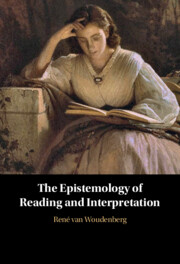Book contents
- The Epistemology of Reading and Interpretation
- The Epistemology of Reading and Interpretation
- Copyright page
- Contents
- Acknowledgments
- Introduction
- Chapter 1 Knowing and Reading
- Chapter 2 Reading and Understanding
- Chapter 3 Sources of Knowledge and Their Individuation
- Chapter 4 Why Reading Doesn’t Reduce Either to Attending to Testimony or to Perception
- Chapter 5 Reading as a Source of Knowledge
- Chapter 6 The Objects of Reading Are the Products of Writing
- Chapter 7 Texts, Meanings, and Interpretation
- Chapter 8 Knowledge through Interpretation (1)
- Chapter 9 Knowledge through Interpretation (2)
- References
- Index
Chapter 7 - Texts, Meanings, and Interpretation
Published online by Cambridge University Press: 03 September 2021
- The Epistemology of Reading and Interpretation
- The Epistemology of Reading and Interpretation
- Copyright page
- Contents
- Acknowledgments
- Introduction
- Chapter 1 Knowing and Reading
- Chapter 2 Reading and Understanding
- Chapter 3 Sources of Knowledge and Their Individuation
- Chapter 4 Why Reading Doesn’t Reduce Either to Attending to Testimony or to Perception
- Chapter 5 Reading as a Source of Knowledge
- Chapter 6 The Objects of Reading Are the Products of Writing
- Chapter 7 Texts, Meanings, and Interpretation
- Chapter 8 Knowledge through Interpretation (1)
- Chapter 9 Knowledge through Interpretation (2)
- References
- Index
Summary
The objects of reading (words, sentences, texts) are objects that have meaning. Meaning is a slippery notion, but we cannot do without it. This chapter distinguishes a number of different notions of meaning: word meaning, sentence meaning, author's meaning, indicative meaning, effect meaning, and value meaning. First, I suggest that knowledge of (these kinds of) meaning cannot be obtained through the natural sciences. Next, a general account of interpretation is offered according to which a statement is an interpretation of a text (or a part thereof) provided it is an attempt to specify the meaning(s) of the text (or its parts). It is furthermore argued that interpretative statements can be true and justified and, hence, that there are interpretative facts of the matter.
- Type
- Chapter
- Information
- The Epistemology of Reading and Interpretation , pp. 161 - 182Publisher: Cambridge University PressPrint publication year: 2021

